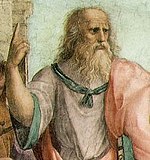Plato
| ||||||||||||||||||||||
Plato (Pípè: /ˈpleɪtoʊ/; Greek: Πλάτων, Plátōn, "broad"[2]; 428/427 BC[a] – 348/347 BC), was a Classical Greek philosopher, mathematician, student of Socrates, writer of philosophical dialogues, and founder of the Academy in Athens, the first institution of higher learning in the Western world. Along with his mentor, Socrates, and his student, Aristotle, Plato helped to lay the foundations of Western philosophy and science.[3] In the famous words of A.N. Whitehead:
The safest general characterization of the European philosophical tradition is that it consists of a series of footnotes to Plato. I do not mean the systematic scheme of thought which scholars have doubtfully extracted from his writings. I allude to the wealth of general ideas scattered through them.[4]
Plato's sophistication as a writer is evident in his Socratic dialogues; thirty-six dialogues and thirteen letters have been ascribed to him. Plato's writings have been published in several fashions; this has led to several conventions regarding the naming and referencing of Plato's texts.
Plato's dialogues have been used to teach a range of subjects, including philosophy, logic, ethics, rhetoric, and mathematics.

|
Àyọkà yìí tàbí apá rẹ̀ únfẹ́ àtúnṣe sí. Ẹ le fẹ̀ jù báyìí lọ tàbí kí ẹ ṣàtúnṣe rẹ̀ lọ́nà tí yíò mu kúnrẹ́rẹ́. Ẹ ran Wikipedia lọ́wọ́ láti fẹ̀ẹ́ jù báyìí lọ. |
Itokasi
[àtúnṣe | àtúnṣe àmìọ̀rọ̀]- ↑ St-Andrews.ac.uk, St. Andrews University
- ↑ Diogenes Laertius 3.4; p. 21, David Sedley, Plato's Cratylus, Cambridge University Press 2003
- ↑ "Plato". Encyclopaedia Britannica. 2002.
- ↑ Process and Reality p. 39

